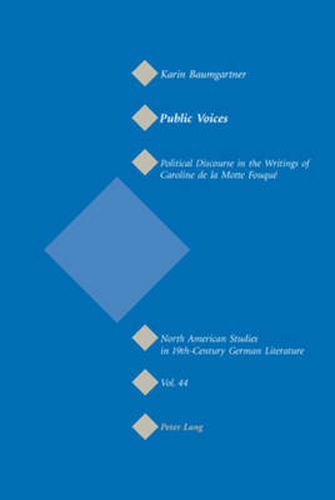Readings Newsletter
Become a Readings Member to make your shopping experience even easier.
Sign in or sign up for free!
You’re not far away from qualifying for FREE standard shipping within Australia
You’ve qualified for FREE standard shipping within Australia
The cart is loading…






This title is printed to order. This book may have been self-published. If so, we cannot guarantee the quality of the content. In the main most books will have gone through the editing process however some may not. We therefore suggest that you be aware of this before ordering this book. If in doubt check either the author or publisher’s details as we are unable to accept any returns unless they are faulty. Please contact us if you have any questions.
This book examines the possibilities of political theorizing in the writings of early nineteenth-century German women and develops a new theory of reading women’s domestic fiction. Drawing on feminism, new historicism, and hermeneutics for its theoretical framework, the study suggests significant changes to Juergen Habermas’s concept of the public sphere and women’s role within it. The book re-evaluates the genre of domestic fiction and traces its use by women writers for political symbolism. Through novels, educational treatises, conduct manuals, poetry, and history books for women and children Caroline Fouque, the principal voice in this study, and other authors of the period participated in the key debates of the early nineteenth century, among them the anguished discussions about the crisis in masculinity after the defeat of the Prussian army in 1806, the discourses of national identity, the construction of a national past, and the reorganization of the feudal state.
$9.00 standard shipping within Australia
FREE standard shipping within Australia for orders over $100.00
Express & International shipping calculated at checkout
This title is printed to order. This book may have been self-published. If so, we cannot guarantee the quality of the content. In the main most books will have gone through the editing process however some may not. We therefore suggest that you be aware of this before ordering this book. If in doubt check either the author or publisher’s details as we are unable to accept any returns unless they are faulty. Please contact us if you have any questions.
This book examines the possibilities of political theorizing in the writings of early nineteenth-century German women and develops a new theory of reading women’s domestic fiction. Drawing on feminism, new historicism, and hermeneutics for its theoretical framework, the study suggests significant changes to Juergen Habermas’s concept of the public sphere and women’s role within it. The book re-evaluates the genre of domestic fiction and traces its use by women writers for political symbolism. Through novels, educational treatises, conduct manuals, poetry, and history books for women and children Caroline Fouque, the principal voice in this study, and other authors of the period participated in the key debates of the early nineteenth century, among them the anguished discussions about the crisis in masculinity after the defeat of the Prussian army in 1806, the discourses of national identity, the construction of a national past, and the reorganization of the feudal state.